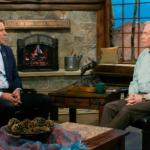In 1964, after he had won the Nobel Peace Prize, Dr. Martin Luther King Jr. sat down for a series of interviews with the author Alex Haley that were edited into one interview that ran in Playboy in 1965—the longest interview King ever gave any publication.
In January 1965, Playboy published Alex Haley’s interview with the Reverend Martin Luther King Jr., shortly after King received the Nobel Peace Prize. In those days, the magazine still wasn’t identifying the interviewer by name, so Haley reported anonymously:
“So heavy were Martin Luther King Jr.’s commitments when we called him last summer for an interview that two months elapsed before he was able to accept our request for an appointment. We kept it—only to spend a week in Atlanta waiting in vain for him to find a moment for more than an apology and a hurried handshake… King was finally able to sandwich in a series of hour and half-hour conversations with us among the other demands of a grueling week. The resultant interview is the longest he has ever granted to any publication.
“Though he spoke with heartfelt and often eloquent sincerity, his tone was one of businesslike detachment. And his mood, except for one or two flickering smiles of irony, was gravely serious.”
Haley: As one who grew up in the economically comfortable, socially insulated environment of a middle-income home in Atlanta, can you recall when it was that you yourself first became painfully and personally aware of racial prejudice?
King: Very clearly. When I was 14, I had traveled from Atlanta to Dublin, Georgia, with a dear teacher of mine, Mrs. Bradley; she’s dead now. I had participated there in an oratorical contest sponsored by the Negro Elks. It turned out to be a memorable day, for I had succeeded in winning the contest. My subject, I recall, ironically enough, was “The Negro and the Constitution.” Anyway, that night, Mrs. Bradley and I were on a bus returning to Atlanta, and at a small town along the way, some white passengers boarded the bus, and the white driver ordered us to get up and give the whites our seats. We didn’t move quickly enough to suit him, so he began cursing us, calling us “black sons of bitches.” I intended to stay right in that seat, but Mrs. Bradley finally urged me up, saying we had to obey the law. And so we stood up in the aisle for the 90 miles to Atlanta. That night will never leave my memory. It was the angriest I have ever been in my life.
Haley: Wasn’t it another such incident on a bus, years later, that thrust you into your present role as a civil rights leader?
King: Yes, it was—in Montgomery, Alabama, in 1955. E. D. Nixon, a Pullman porter long identified with the NAACP, telephoned me late one night to tell me that Mrs. Rosa Parks had been arrested around 7:30 that evening when a bus driver demanded that she give up her seat, and she refused—because her feet hurt. Nixon had already bonded Mrs. Parks out of prison. He said, “It’s time this stops; we ought to boycott the buses.” I agreed and said, “Now.” The next night we called a meeting of Negro community leaders to discuss it, and on Saturday and Sunday we appealed to the Negro community, with leaflets and from the pulpits, to boycott the buses on Monday. We had in mind a one-day boycott, and we were banking on 60 percent success. But the boycott saw instantaneous 99 percent success. We were so pleasantly surprised and impressed that we continued, and for the next 381 days the boycott of Montgomery’s buses by Negroes was 99-9/10 percent successful.
Haley: Can you recall any mistakes you’ve made in leading the movement?
King: Well, the most pervasive mistake I have made was in believing that because our cause was just, we could be sure that the white ministers of the South, once their Christian consciences were challenged, would rise to our aid. I felt that white ministers would take our cause to the white power structure. I ended up, of course, chastened and disillusioned. As our movement unfolded, and direct appeals were made to white ministers, most folded their hands—and some even took stands against us.
Let me hasten to say there are some outstanding exceptions. As one whose Christian roots go back through three generations of ministers—my father, grandfather and great-grandfather—I will remain true to the church as long as I live. But the laxity of the white church collectively has caused me to weep tears of love. There cannot be deep disappointment without deep love. Time and again in my travels, as I have seen the outward beauty of white churches, I have had to ask myself, “What kind of people worship there? Who is their God? Is their God the God of Abraham, Isaac, and Jacob, and is their Savior the Savior who hung on the cross at Golgotha? Where were their voices when a black race took upon itself the cross of protest against man’s injustice to man? Where were their voices when defiance and hatred were called for by white men who sat in these very churches?”
I shall never forget the grief and bitterness I felt on that terrible September morning when a bomb blew out the lives of those four little, innocent girls sitting in their Sunday-school class in the 16th Street Baptist Church in Birmingham. I think of how a woman cried out, crunching through broken glass, “My God, we’re not even safe in church!” I think of how that explosion blew the face of Jesus Christ from a stained-glass window. It was symbolic of how sin and evil had blotted out the life of Christ. I can remember thinking that if men were this bestial, was it all worth it? Was there any hope? Was there any way out?
Read the rest here















